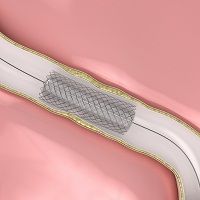Article
Abiomed Responds To "Flawed" Analysis Criticizing Safety of Impella Devices
Author(s):
Seth Bilazarian, MD, medical director of Abiomed, responds to an analysis presented at AHA 2019 suggesting Impella devices were associated with a greater risk of death and stroke.

Abiomed has issued a staunch response after a study suggested the company’s Impella® devices were associated with a higher risk of death and other major adverse events when compared to intra-aortic balloon pumps.
Officials from Abiomed suggest the study, which presented by Amit Amin, MD, presented at the American Heart Association (AHA) 2019 Scientific Sessions in Philadelphia, had multiple inaccuracies and patient populations with significantly sicker patients.
“This observational, non-FDA audited analysis is fundamentally flawed because it is based on poor quality, retrospective, payer coding data that lumps all indications together and is impossible to properly propensity match,” said Seth Bilazarian, MD, medical director of Abiomed. “In this data set, a patient walking in for an elective procedure looks the same as a patient in cardiac arrest with cardiogenic shock.”
The study was an observational analysis comparing Impella® devices to intra-aortic balloon pumps in 48,306 patients who underwent percutaneous coronary intervention with mechanical circulatory support for high-risk percutaneous coronary intervention or cardiogenic shock. Outcomes of interest for the investigators included in-hospital mortality, bleeding, acute kidney injury, stroke, hospitalization costs, and length of stay. Investigators also performed analyses that examined trends based on time-period and hospital-level Impella® use.
Investigators analyses adjusted for 37 potential confounders and observed a greater risk of death (24%), bleeding (10%), acute kidney injury (8%), and stroke (34%) among Impella® devices. In regard to cost, analyses revealed a $15,000 higher incremental hospitalization cost despite a 0.91 days lower length of stay found with Impella® use. The primary driver behind this increase was from the central supply, surgery, and cardiology departments but was offset by lower costs due to length of stay.
However, Bilzarian suggests the study design was flawed and patients who were included in the Impella® group. Bilzarian pointed out patients in the Impella® group were older and had higher rates of multi-vessel disease, chronic renal failure at baseline, NSTEMI, heart failure, and diabetes. He also noted patients in the Impella® patient group underwent more atherectomy than patients in the intra-aortic balloon pumps.
Bilzarian also keyed in on missing data not included in the study in regard to patient and procedural characters. This included degree of shock and metabolic derangement, rate of surgical turndown patients, and the rate of Impella® pre-percutaneous coronary intervention and Impella® post-percutaneous coronary intervention.
Furthermore, Bilzarian also pointed out intra-aortic balloon pumps are deemed as potentially harmful by regulatory commissions in Europe and Japan for routine use in shock and lack approval from the US Food and Drug Administration while Impella® devices have received the FDA’s highest level of regulatory approval. Additionally, more than 550 peer-reviewed publications and guidelines of 8 clinical societies include the use of Impella® devices.





